University life and study in the United States and Morocco
Within the framework its policy of cultural openness, the College of Health Sciences organized a seminar on university study and life in Morocco and the United States. The seminar brought together students at theCollege of Health Sciences with more than twenty students from eight American universities.
This one-day seminar envisaged to provide a plateform for effective communication and exchange of opinions between the moroccan students and their american peers on academic, social and cultural aspects of university life.
After getting to know each others, the students of the College of Health Sciences started the seminar with four presentations.
The first presentation addressed the cultural, social and historical framework of the educational system in Morocco and the importance of this framework for preserving the Moroccan identity and cultural heritage during the process of modernization.
The second presentation gave the American students an opportunity to get acquainted with the structure and the function of the Moroccan educational system as well as the strategic challenges to ensuring equal access to education, linking education with development, fighting unemployment, and ameliorating value-added research.
The third presentation was devoted to higher education in health sciences in Morocco and addressed in details the national effort to redress the shortage in health manpower through education.
The fourth and final presentation addressed the realities of students life and highlighted the cultural, economic and social determinants of life style of the moroccan students.
On the other hand, the American students gave three presentations.
The first presentation appreciated the vastness and diversity of the American higher education system, whose student's size approaches the population of Morocco. The presentation defined different types of higher education institutions and gave statistics about the enrolment and academic degrees offered by each type. A special emphasis of the last part of this presentation was placed on the commonalities among these institutions, which can be called features of the American university system.
The second presentation was devoted to education of health professionals, in which the educational pathes for education of doctors, nurses, physical therapist, speech-language pathologists and medical technologists were presented in details. The presentation covered also the professional career after an associate degree in health sciences.
The third presentation addressed the personal and social life of the American students during their studies. It highlighted the importance of this stage of life in determining the intellectual capacity and the political orientation of students. Likewise, the importance of sports was outlined and many examples were given to the interest attached to sports by American universities. Finally, the presentation shed light on the inevitable fact that the majority of American students have to work to finance their studies.
After these presentations, a group discussion was held among the presenting students which included questions and answers section as well as open debate with the public. The discussion continued among students after the seminar that was very positively appreciated by the students.
This one-day seminar envisaged to provide a plateform for effective communication and exchange of opinions between the moroccan students and their american peers on academic, social and cultural aspects of university life.
After getting to know each others, the students of the College of Health Sciences started the seminar with four presentations.
The first presentation addressed the cultural, social and historical framework of the educational system in Morocco and the importance of this framework for preserving the Moroccan identity and cultural heritage during the process of modernization.
The second presentation gave the American students an opportunity to get acquainted with the structure and the function of the Moroccan educational system as well as the strategic challenges to ensuring equal access to education, linking education with development, fighting unemployment, and ameliorating value-added research.
The third presentation was devoted to higher education in health sciences in Morocco and addressed in details the national effort to redress the shortage in health manpower through education.
The fourth and final presentation addressed the realities of students life and highlighted the cultural, economic and social determinants of life style of the moroccan students.
On the other hand, the American students gave three presentations.
The first presentation appreciated the vastness and diversity of the American higher education system, whose student's size approaches the population of Morocco. The presentation defined different types of higher education institutions and gave statistics about the enrolment and academic degrees offered by each type. A special emphasis of the last part of this presentation was placed on the commonalities among these institutions, which can be called features of the American university system.
The second presentation was devoted to education of health professionals, in which the educational pathes for education of doctors, nurses, physical therapist, speech-language pathologists and medical technologists were presented in details. The presentation covered also the professional career after an associate degree in health sciences.
The third presentation addressed the personal and social life of the American students during their studies. It highlighted the importance of this stage of life in determining the intellectual capacity and the political orientation of students. Likewise, the importance of sports was outlined and many examples were given to the interest attached to sports by American universities. Finally, the presentation shed light on the inevitable fact that the majority of American students have to work to finance their studies.
After these presentations, a group discussion was held among the presenting students which included questions and answers section as well as open debate with the public. The discussion continued among students after the seminar that was very positively appreciated by the students.
COLLEGE OF HEALTH SCIENCESAuthorized by the Ministry of Higher Education, Scientific Research and Professional Training (Authorization No. 434/2015)
Member of the Association of Schools of Public Health in the European Region (ASPHER) Partner of the City University of New York (CUNY) 14, Boulevard de Paris, 20000 Casablanca, Morocco Tel.: 0522475775 | Fax: 0522 475778 | Email: info@esss.ac.ma |
